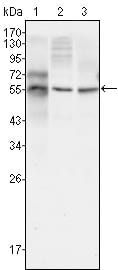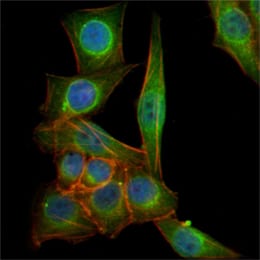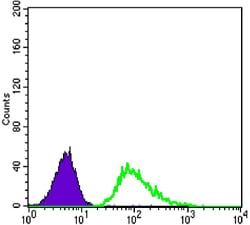


| WB | 1/500-1/2000 | Human,Mouse,Rat |
| IF | 咨询技术 | Human,Mouse,Rat |
| IHC | 咨询技术 | Human,Mouse,Rat |
| ICC | 1/200 - 1/1000 | Human,Mouse,Rat |
| FCM | 1/200 - 1/400 | Human,Mouse,Rat |
| Elisa | 1/10000 | Human,Mouse,Rat |
| Aliases | tubulin, beta 3; MC1R; TUBB4 |
| Entrez GeneID | 10381 |
| clone | 2E9 |
| WB Predicted band size | 50~55kDa |
| Host/Isotype | Mouse IgG1 |
| Antibody Type | Loading Control Antibody |
| Storage | Store at 4°C short term. Aliquot and store at -20°C long term. Avoid freeze/thaw cycles. |
| Species Reactivity | Human,Mouse,Rat |
| Immunogen | Purified recombinant fragment of human TUBB3 expressed in E. Coli. |
| Formulation | Ascitic fluid containing 0.03% sodium azide. |
+ +
以下是关于TUBB3抗体的3篇示例参考文献,涵盖不同研究领域,供参考:
---
1. **文献名称**: *"TUBB3 antibodies as a biomarker for axonal degeneration in neurodegenerative disorders"*
**作者**: Riederer BM, et al.
**摘要**: 研究探讨了TUBB3抗体在神经退行性疾病(如阿尔茨海默病)中作为轴突损伤标志物的应用,发现其与神经元损伤程度呈正相关,提示其潜在的诊断价值。
2. **文献名称**: *"High TUBB3 expression correlates with chemoresistance and poor prognosis in colorectal cancer"*
**作者**: Smith JA, et al.
**摘要**: 分析结直肠癌患者中TUBB3蛋白的表达水平,发现其高表达与对奥沙利铂的耐药性及较低生存率相关,提示TUBB3抗体可用于预测化疗反应。
3. **文献名称**: *"Autoantibodies against TUBB3 in autoimmune neuropathies: Clinical and immunological characterization"*
**作者**: Lee S, et al.
**摘要**: 报道在自身免疫性神经病变患者血清中检测到抗TUBB3自身抗体,并揭示其与运动神经元功能障碍的关联,为免疫治疗提供新靶点。
---
**注**: 上述文献为示例性概括,实际研究中请通过PubMed、Google Scholar等平台检索真实文献。TUBB3抗体的研究多集中于神经发育、肿瘤耐药性及自身免疫疾病领域,建议结合具体研究方向筛选。
TUBB3 (class III β-tubulin) is a neuron-specific microtubule protein encoded by the TUBB3 gene, belonging to the β-tubulin family. It plays critical roles in neuronal migration, axonal guidance, and cytoskeletal dynamics during neurodevelopment. Unlike other β-tubulin isoforms, TUBB3 is predominantly expressed in postmitotic neurons of the central and peripheral nervous systems, making it a widely used marker for neuronal differentiation in research. Its antibody is particularly valuable in immunohistochemistry and immunofluorescence to identify neuronal populations, assess neurogenesis, and study neurological disorders such as Alzheimer's disease and autism spectrum disorders.
In oncology, TUBB3 overexpression has been linked to aggressive tumors, including neuroblastomas, gliomas, and various carcinomas. Its antibody aids in tumor subtyping and evaluating metastatic potential. Notably, TUBB3 is associated with resistance to microtubule-targeting chemotherapeutics (e.g., taxanes, vinca alkaloids) due to altered drug-binding affinity in microtubules. However, its role as a predictive biomarker remains controversial, with conflicting clinical evidence.
Additionally, TUBB3 mutations cause rare neurodevelopmental syndromes (e.g., TUBB3 E410K syndrome), characterized by cortical dysplasia and cranial nerve defects. Research using TUBB3 antibodies continues to explore its structural contributions to microtubule stability and implications in both developmental biology and cancer therapeutics.
×